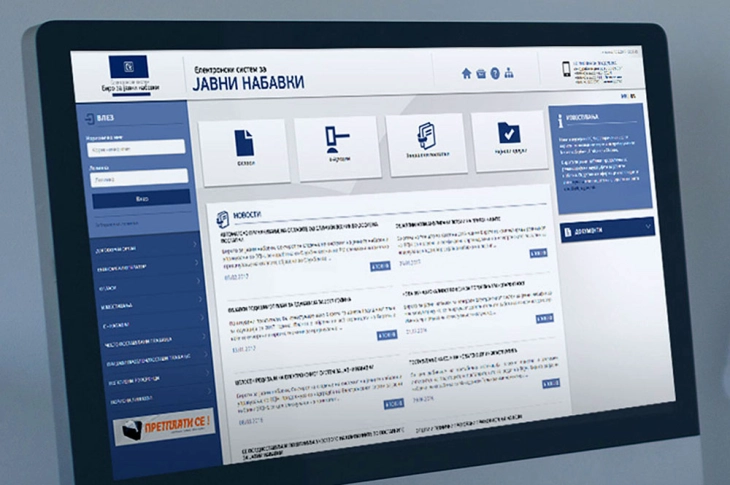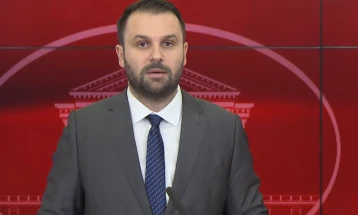EC: National authorities should introduce more effective anti-corruption measures across the procurement cycle
- North Macedonia is moderately prepared in the area of public procurement and limited progress was made in the reporting period, reads the European Commission's (EC) latest report on the country's progress.

Skopje, 12 November 2023 (MIA) - North Macedonia is moderately prepared in the area of public procurement and limited progress was made in the reporting period, reads the European Commission's (EC) latest report on the country's progress.
The report notes that the capacity of key institutions, contracting authorities and economic operators should be increased through continuous training.
"National authorities should introduce more effective anti-corruption measures across the procurement cycle. The direct award of the contract for the construction of Corridor VIII and X-d raises concerns as it exempts the project from applying the law on public procurement," says the EC.
According to the Commission, the recommendations from last year’s report were not fully implemented and therefore remain valid.
In the coming year, North Macedonia should in particular adopt the public-private partnership law and the law on concessions, to further align the legal framework in these areas with the EU acquis, improve coordination among key stakeholders and strengthen their capacity to implement the principles of transparency, free competition, equal treatment and non-discrimination, further increase the use of 'most economically-advantageous tender' (MEAT) criteria for the award of contracts, and improve the monitoring of public procurement procedures through reporting and efficient follow-up of irregularities, conflict of interest cases and fraudulent practices.
Institutional set-up and legal alignment
The legal framework on public procurement is broadly aligned with the EU acquis, the EC notes0. The practice of ‘blacklisting’ companies due to professional misconduct during the procurement phase continued, although this is not in line with EU rules. In 2022, 55 negative references were issued against 50 economic operators, of which 21 expired and nine were removed by the Public Procurement Bureau. By the end of 2022, 25 negative references issued in 2022 were active, as well as six negative references issued in 2018 and 2019. The finalisation and adoption of the Law on PPP and the Law on concessions are still pending.
"In March 2023, the government approved a contract for the construction of highway sections along Corridor VIII and X-d. The contract was directly awarded to an international consortium without a competitive procedure as the ad hoc Law on determining the public interest and the Law on nominating a strategic partner for the implementation of the project for the construction of infrastructure Corridor VIII and X-d adopted by the Parliament in 2021 exempts the project from the application of the law on public procurement. In May 2023, the Government submitted for adoption to the Parliament legal amendments that are necessary for the implementation of the project. These laws were labelled with the EU flag to fast-track the procedure, although this was not an appropriate use of the procedure," reads the report.
The 2022-2026 public procurement strategy is under way. According to the first monitoring report of 2022, 68% of the activities have been fully implemented, 8% are ongoing and 24% were moved forward to 2023. The Public Procurement Bureau (PPB) continued to modernise and improve the country’s public procurement system and to enhance the system's performance and functionalities. However, the PPB's capacity, monitoring and control competencies need to be strengthened.
The Public Procurement Bureau and Ministry of Economy continued activities to accede to the WTO Agreement on Government Procurement (GPA). On 7 June 2023, the Committee on Government Procurement decided on the accession of North Macedonia to the GPA.
In 2022, a Memorandum of Understanding to exchange information and standardise procedures was signed between the Public Procurement Bureau, the State Appeals Commission, the Commission for the Protection of Competition, the State Audit Office and the State Commission for Preventing Corruption. This should result in a more effective exchange of data and information with the objective of enhancing consistency and integrity in implementing the legal framework.
The capacity of the Ministry of Economy, the Ministry that deals with concessions and PPPs, remains limited. In 2022, only one new agreement establishing a PPP was concluded. The PPP register and the register on concessions still need to be set up.
The electronic system for public procurement, notes the EC, is working efficiently. Despite the development of an e marketplace platform and e-catalogues, procuring entities demonstrated little interest in using this system. In 2022, 70 small value procurements were concluded using e-market. Contracting authorities' annual procurement plans are regularly published on the electronic system for public procurement. The electronic archive module ensures the integrity of electronic procedures by keeping the documentation in original electronic form, while the e-complaints module provides for an electronic exchange of data with the appeals procedures.
Implementation and enforcement capacity
In 2022, the public procurement market amounted to 8.6% of the country’s GDP as compared to 11% in 2021. It represented25% of the state budget. The capacity of both central and local contracting authorities needs to be strengthened. On the award criteria used in public procurement procedures, the use of 'most economically advantageous tender' (MEAT) is still limited. In 2022, only 1 383 procurement notices out of 22 901 applied MEAT criteria (6.03%). There is a need for organisation of continuous training of contracting authorities on how to apply this criterion.
Contract award and implementation monitoring shows that the use of negotiated procurement procedures (number of procedures) fell to 6.6% in 2022, from 8% in 2021. An assessment of the use of centralised procurement and framework agreements by the Public Procurement Bureau is under way. The proportion of the overall value of public procurement awarded to SMEs increased to 57% in 2022 compared to 53% in 2021. Tender cancellation (number of procedures) increased to 31% compared to 28.8% in 2021. In 2022 the average number of bids accounted for three bids per tender procedure and approximately one third of contracts were awarded in tender procedures with a single bid.
Capacity to manage public procurement processes needs to be further enhanced, especially by local authorities, to ensure a more coherent approach in managing the procurement cycle. The quality of tender documentation remains a challenge for smaller contracting authorities. The regulatory and institutional mechanisms on integrity and conflict of interest are still insufficient. There is no risk assessment system embedded in the procurement cycle to ensure timely information on possible corrupt practices or to flag irregularities.
Efficient remedy system
The legislation on the right to legal remedy is broadly aligned with the EU acquis. The implementation capacity of the State Appeals Commission is insufficient for handling the number of appeals (967 in 2022, 1 109 in 2021). Additional qualified staff are needed to ensure timely processing of the appeals. In the reporting period, 83 complaints were filed against the decisions of the State Appeals Commission before the Administrative Court.
On the prevention of corruption, the public procurement strategy includes measures to fight against corruption and conflict of interest. However, the follow-up of red flag reports published on the PPB’s website is insufficient. The country should improve institutional coordination with the State Commission for Prevention of Corruption and law enforcement institutions to follow up on the findings of red flag reports, reads the report.
Photo: MIA archive







